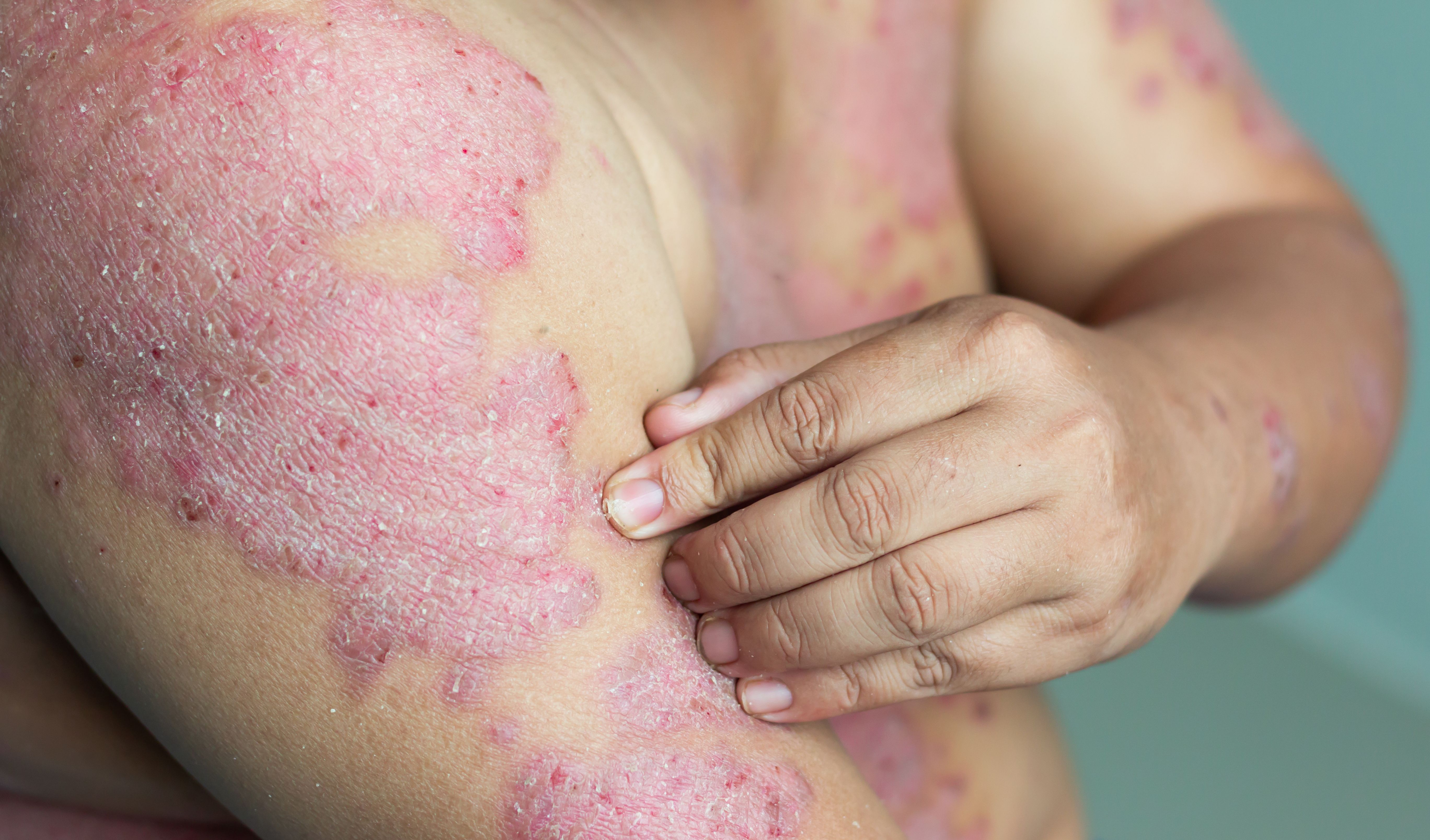- Case-Based Roundtable
- General Dermatology
- Eczema
- Chronic Hand Eczema
- Alopecia
- Aesthetics
- Vitiligo
- COVID-19
- Actinic Keratosis
- Precision Medicine and Biologics
- Rare Disease
- Wound Care
- Rosacea
- Psoriasis
- Psoriatic Arthritis
- Atopic Dermatitis
- Melasma
- NP and PA
- Skin Cancer
- Hidradenitis Suppurativa
- Drug Watch
- Pigmentary Disorders
- Acne
- Pediatric Dermatology
- Practice Management
- Prurigo Nodularis
- Buy-and-Bill
Publication
Article
Dermatology Times
Can-Fite explores muscle tissue to fight psoriasis, cancer
Author(s):
Chief executive officer of Can-Fite Biopharmaceuticals, Pnina Fishman, Ph.D. discovered why cancer and inflammation can go everywhere in the body, except muscle tissue. Using this knowledge, Can-Fite has developed a promising psoriasis drug, piclidenoson, which is currently in phase 3 clinical trials.
With its first drug under development, piclidenoson, Can-Fite is looking to treat psoriasis. (Nikkikii - stock.adobe.com)

Pnina Fishman, Ph.D.

Cancer and inflammation can metastasize and affect virtually every organ in the body, including the skin. However, there’s one part of the body that resists both conditions - the muscles.
Pnina Fishman, Ph.D., an immunology and oncology researcher, wanted to know why. And, she was curious to know if she could do something about it.
“I came across a very interesting question,” she said. “Why did cancer and inflammation go everywhere in the body, but not in the muscle tissue when it accounts for nearly 65 percent of body weight?”
That query launched Fishman, then a professor of life sciences and the head of the Lab of Clinical & Tumor Immunology at Felsenstein Medical Research Institute at Tel Aviv University, down at path with her colleagues that ultimately revealed muscles have a natural defense to cancer and inflammation assault. Her research showed muscles release small molecules that have inherent anti-cancer and anti-inflammation properties.
Muscles, she said, activate the A3 adenosine receptor (A3AR) that inhibits cell growth. Because A3AR is found in much higher quantities in cancer and inflammatory cells than in normal, healthy cells, targeting the receptor with specific drug therapies can cause cancer and inflammation cell death. More in-depth research also showed A3AR is a predictive biomarker that can identify individuals that are most responsive to these types of drugs.
With this knowledge, Fishman and a fellow faculty member, Ilan Kohn, Ph.D., founded Can-Fite Biopharmaceuticals Ltd., in 2000. Fishman has served as its chief executive officer (CEO) since 2005, and Kohn is the Chairman of the Board.
THE ROAD TO CEO
Since the beginning of her academic career as a student at Bar-Ilan Univeristy, Fishman has maintained an interest in the body’s cells and their functions. Her studies and research led her from microbiology to hematology to oncology and immunology.
“All of my academic career, I had been interested in the relationship between cancer disease and inflammatory disease,” she said. “And, when my lab made the discovery about muscles and the small molecules, I realized there was a chance to develop a drug or drugs out of this idea.”
At that point, she went to Kohn and asked him to draft a patent to protect the intellectual property. He agreed and also committed to contributing $1 million to start Can-Fite. In order to grow the company, however, Fishman stepped back from her professorship and devoted all her energies to the new venture, including forging partnerships with investigators at other institutions, such as the National Institutes of Health.
“As a result of our partnership, we have a very good framework and basis for drug development in place,” Fishman said.
Today, the company is publicly traded on the New York Stock Exchange.
FIRST DERMATOLOGY DRUG
With its first drug under development, piclidenoson, Fishman said, Can-Fite is looking to treat psoriasis. The same drug, currently in phase 3 clinical trials, also has an indication for rheumatoid arthritis. Although there are several existing treatment options for psoriasis, including acitretin, cyclosporine, and methotrexate, piclidenoson is designed to be different, she said.
Piclidenoson binds to the Gi protein associated with A3AR which is over-expressed in psoriasis patients. Instead of an injection or infusion, patients take piclidenoson orally twice a day, eliminating the need to schedule an outpatient clinic visit. According to clinical study data, based on approximately 1,200 participants, it causes no adverse side effects, reactions or events compared to the other psoriasis medications. Patients taking other therapies often experience nausea, vomiting, and fatigue, among other responses, Fishman said.
“This is a huge benefit for patients with the chronic condition psoriasis, for which they might take medication their entire lifetime,” she said. “Taking a drug that has a large adverse effect profile isn’t a good thing for this patient population.”
Alongside piclidenoson, Can-Fite has two other drugs under development. Namodenoson, currently in phase 2 studies, is designed to target liver cancer and its preceding conditions - non-alcoholic fatty liver disease and non-alcoholic steatohepatitis. A third, unnamed drug is also intended to combat inflammation in several arthritis conditions.
WHAT’S NEXT?
In addition to the three existing drugs, Fishman said, there are several indications the company would like to pursue in the future, including prostate cancer, breast cancer, and melanoma. At this point, however, she said, she and her colleagues are concentrating on bringing these three drugs through the pipeline with the help of the Food & Drug Administration and the European Medicines Agency within the next five years.
Although there are no plans to market directly to patients, Can-Fite intends to secure licensing agreements. Several are already in place, she said, but the goal is to expand globally. They also plan for the price point to hit somewhere between existing biologics and methotrexate.
“We want to position ourselves as the small molecule, orally-available, affordable drug with the excellent safety profile,” she said.
Ultimately, Fishman said, rather than treating patients with biologics or methotrexate and waiting to see if they fail these therapies while experiencing adverse reactions, she would like to see piclidenoson be the go-to drug for patient suffering from psoriasis.
“We would like to be the first-line treatment so the patient will be able to get the drug for a lifetime without suffering adverse events and won’t need to go to the outpatient clinic,” she said. “They just need two tablets - one in the morning and one in the evening - and their skin will be clear without negative effects.”






